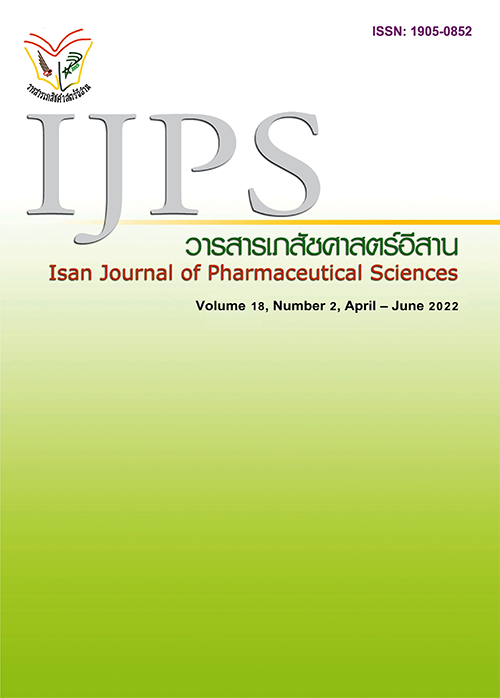Impact of Pharmaceutical Care on The Awareness of Rational Antibiotic Use in Patients with Upper Respiratory Tract Infections at Community Pharmacy, Mueang District, Ubon Ratchathani Province
Main Article Content
Abstract
Introduction: Patient compliance on rational use of antibiotic drug can help to prevent drug resistance. Objective: To evaluate the effect of pharmaceutical care on the awareness of use of antibiotic drug in patient with upper respiratory tract infection at community pharmacy. Materials and Methods: A pre-post experimental study has been conducted. The customers who came with common cold, pharyngitis and tonsillitis were randomly sampling at 6 community pharmacies in Mueang district, Ubon Ratchathani Province during November 2021 to January 2022. Participants were grouped according to the McIsaac score. The clinical outcomes were follow-up within 5 to 7 days. The awareness, expectation, and behavior about antibiotic drugs use were compared by using paired sample t-test and McNemar test Results: Among the 46 participants, 29 of them (63.04%) were female. An average age was 39.89 ± 12.76 year. Of these, 34 participants (73.91%) had the McIsaac score within 0-1 point. Twenty-seven (58.70%) participants had not been advised for the use of antibiotic drugs within 6 months. After providing a pharmaceutical care, 12 participants (26.08%) received antibiotic drug according to the guideline. Among 34 participants who do not require for antibiotic drugs, 20 of them (58.82%) had change the expectation to use the antibiotic drug after advice. The average score of awareness, expectation, and behavior according to the antibiotic drugs were statistical increase after providing of pharmaceutical care (mean difference 1.68; 95% CI 2.05-1.32, 1.34; 95% CI 1.67-8.15, and 0.20; 95% CI 0.34-0.05 respectively). The proportion of participants, who had high level of awareness and expectation, were also statistical increase. However, all participants had an improved symptoms or completed cure within 7 days after providing service. Conclusion: Pharmaceutical care in community pharmacy can help to increase the awareness and promote the rational use of antibiotics in patients with upper respiratory tract infections.
Article Details

This work is licensed under a Creative Commons Attribution-NonCommercial-NoDerivatives 4.0 International License.
In the case that some parts are used by others The author must Confirm that obtaining permission to use some of the original authors. And must attach evidence That the permission has been included
References
Best JW & Kahn JV. Research in education (10th edition). United States of America: Pearson Education Limited. 2014. 153-155.
Bureau of drug control, Food and Drug Administration and Faculty of Pharmacy, Srinakharinwirot University. Outcomes of the antibiotics smart use project: a pilot study in Saraburi province; 2008.
Chongtrakul P. RDU Hospital: The Pathway to Rational Drug Use. Thai J Pharmaco 2015; 37(1):48–62.
Committee for Developing Guidelines and Handbook for RDU Pharmacy. Antibiotics smart use complementary guidance for community pharmacist [internet]. 2007 May [cited 2021 Apr 20]. Available from: www. pharmacy.psu.ac.th/images/rdu-eagle2018.pdf.
Community Pharmacy Association (Thailand). Antibiotic smart use in drug store. All about infection conference 2012; 2012 August 19; Bangkok: Thailand; 2012.
Davis ME, Liu TL, Taylor YJ, Davidson L, Schmid M, Yates T, et al. Exploring patient awareness and perceptions of the appropriate use of antibiotics: a mixed-methods study. Antibiotics (Basel, Switzerland)2017; 6(4).
Donsamak S, Marjorie CW, Dai NJ. Evaluation of antibiotic supply decisions by community pharmacists in Thailand: A Vignette study. Antibiotics 2021;10(154).
Duangrudee K. Factors Affecting Attitude and Awareness of Risk Management Case Study: An Import Export Company. [internet]. 2014 [cited 2021 Apr 20]. Available from: http://it.nation.ac.th /studentresearch/files/5509105.pdf.
Komwong D, Thewthus Sangkhawat. Factors Affecting Drug Use Behaviors of Village Health Volunteers. TPHSJ 2012; 7(3): 121-126.
Mclsaac WJ, White D, Tannenbaum D, Low DE. A clinical score to reduce unnecessary antibiotic use in patients with sore throat. CMAJ 1998;158:75-83.
O’Neill J. Tackling drug-resistant infections globally: final report and recommendations the review on antimicrobial resistance chaired by Jim O’Neill [internet]. 2016 May 19 [cited 2021 Apr 20]. Available from: https://amr-review.org/sites/default/files/160518_Final%.pdf.
Phumart P, Phodha T, Thamlikitkul V, Riewpaiboon A, Prakongsais P, Limwattananon S. Health and Economic Impacts of Antimicrobial Resistant Infections in Thailand: A Preliminary Study. JHSR 2012; 6(3),352–60.
Singhan Wa, Permsuwan U, Effect of Community Pharmacist’s Counseling to Reduce Inappropriate Antibiotics Use for Patients with Upper Respiratory Tract Infection. Thai J Pharm Prac 2020; 12(1): 4-11.
Somchan P, Leethongdeesakul S, Loyha K. Pharmaceutical care system for acute upper respiratory tract infection and acute bronchitis patient care to promote rational use of antibiotic in Nachaluai hospital, Nachaluai District, Ubon Ratchathani Province. UBRU journal for public health research 2020;9(2):148-60.
Spurling GK, Del Mar CB, Dooley L, Foxlee R. Delayed antibiotics for respiratory infections. Cochrane Database Syst Rev. 2007(3):CD004417.
Ubon Ratchathani Provincial Health Office. List of authorized establishments. [internet]. 2018 May [cited 2021 Apr 20]. Available from: http://ssj08.phoubon.in.th/register_allow.html.
Uruekoran R, Phonsena W, Thongdang S, Somsaard P, Chaiyasong S, Srisilp T. Treatment Outcome and Cost of Rationale Antibiotic Use Implementation in Mahasarakham University Pharmacy. IJPS 2013; 9(3): 31-42.
World Health Organization. Antibiotic resistance: multi-country public awareness survey. [internet]. 2015 [cited 2022 June 7]. Available from: https://apps.who.int/iris/bitstream/handle/10665/194460/97892415?sequence=1.
Yuto Ti, Ketsin T, Anantasan P, Siltrakool B, Kangwanrattanakul K. Phanudulkittia C. Consumers’ Awareness, Expectation, and Behaviors related to Antibiotic Use of Consumers in Community Pharmacies in Saensuk Municipality, Chonburi Province. PHJBUU 2020; 15(2): 62-74.


